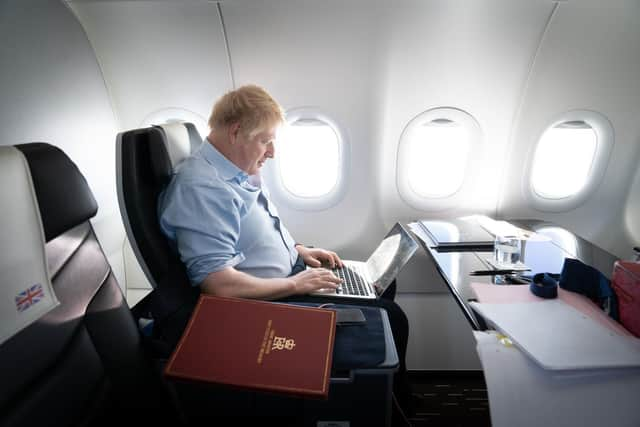Ukraine crisis, Iran and Saudi Arabia headlines are all connected - Bill Carmichael
Nazanin Zaghari-Ratcliffe, a British-Iranian woman accused of spying by the Iranian authorities, was finally released after six years detention and was able to fly to the UK to be reunited with her husband and seven-year-old daughter.
She was freed, alongside another British-Iranian, Anoosheh Ashoori, jailed on similar charges – which they both emphatically deny – after the British government apparently agreed to settle a £400 million debt the Iranians said was owed to them for a cancelled deal to supply Chieftain tanks back in the 1970s.
Advertisement
Hide AdAdvertisement
Hide AdWe need a bit of positive news because the dispatches from the ongoing war in Ukraine are unrelentingly grim. Reports that Russian troops shot dead 10 people queuing up for bread in the north-eastern city of Chernihiv, and bombed a theatre full of civilians in Mariupol, are just the latest in a daily list of atrocities committed by the brutal Putin regime.


Meanwhile, the British Prime Minister took time out of a no-doubt frantic schedule to visit Saudi Arabia and the United Arab Emirates to discuss security of energy supplies.
At first sight these three stories – in Ukraine, Iran and Saudi Arabia - may seem chosen at random from this week’s headlines and entirely disconnected. But on closer inspection they are all related and demonstrate the new realities of a world utterly changed by Russia’s unprovoked attack on Ukraine.
For example, the thawing of our relations with Iran is probably not unconnected to the fact that the country holds about 10 per cent of the world’s proven oil reserves and 15 per cent of its gas. Similarly, Saudi Arabia is widely regarded as one of the world’s most important producers of oil with about a fifth of the world’s reserves.
Advertisement
Hide AdAdvertisement
Hide AdIf the West is serious about weaning itself off Russian oil and gas, both Iran and Saudi Arabia could have major parts to play – hence the developments this week. For some this is a reprehensible step. Labour leader Sir Keir Starmer criticised the Prime Minister’s visit to the Gulf saying: “Going cap in hand from dictator to dictator is not an energy strategy.”
He has a point. Saudi Arabia has an utterly vile regime. Last weekend the kingdom carried out the mass execution of 81 men in a day, and Crown Prince Mohammed Bin Salman was heavily implicated in the gruesome murder of journalist Jamal Khashoggi in 2018.
Iran meanwhile is ruled by backward theocratic bigots who are quite happy to shoot dead peaceful demonstrators in the streets of Tehran, and hang people from cranes for the “crime” of being gay.
But sadly we have to deal with the world as it is, rather than the way we would like it to be.
Advertisement
Hide AdAdvertisement
Hide AdUnfortunately, there are dozens of authoritarian regimes around the world that are implacably hostile to human dignity and individual liberty, and which combine brutal repression at home with aggressive threats to their peaceful neighbours.
We in the free and democratic West have no choice other than to hold our noses and occasionally do business with these despots and tyrants. It is called “realpolitik” and that means putting aside ethical and moral concerns in favour of pragmatic or realistic solutions to today’s problems. And our biggest problem currently is stopping the massacre of civilians in Ukraine by Putin’s goons. The threat of a tightening embargo by the entire West on Russian oil and gas is perhaps one important step towards achieving that. And if that means doing business with repressive regimes so be it.
This doesn’t mean these people are our friends, or that we should trust them as much as an inch. As the saying goes, if you sup with the devil you need a long spoon.
Neither does it mean we should tone down our criticism of their appalling human rights records, as the Prime Minister made clear this week.
Advertisement
Hide AdAdvertisement
Hide AdBut one thing is now abundantly clear – the energy policy of the entire Western world over the last decades, driven by environmental concerns, has been an unmitigated catastrophe, leading to sky high prices and reliance on Russia.
We should aim for energy security and self-sufficiency through fracked gas, new carbon-free nuclear and renewables.
But until that day comes – and it is a long way off – we will need to do business with Iran and Saudi Arabia, whether we like it or not.